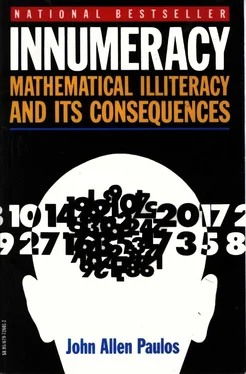Assume the probability to be one out of 10,000 that a particular dream matches in a few vivid details some sequence of events in real life. This is a pretty unlikely occurrence, and means that the chances of a nonpredictive dream are an overwhelming 9,999 out of 10,000. Also assume that whether or not a dream matches experience one day is independent of whether or not some other dream matches experience some other day. Thus, the probability of having two successive nonmatching dreams is, by the multiplication principle for probability, the product of 9,999/10,000 and 9,999/10,000. Likewise, the probability of having N straight nights of nonmatching dreams is (9,999/10,000) N; for a year's worth of nonmatching or nonpredictive dreams, the probability is (9,999/10,000) 365.
Since (9,999/10,000) 365is about.964, we can conclude that about 96.4 percent of the people who dream every night will have only nonmatching dreams during a one-year span. But that means that about 3.6 percent of the people who dream every night will have a predictive dream. 3.6 percent is not such a small fraction; it translates into millions of apparently precognitive dreams every year. Even if we change the probability to one in a million for such a predictive dream, we'll still get huge numbers of them by chance alone in a country the size of the United States. There's no need to invoke any special parapsychological abilities; the ordinariness of apparently predictive dreams does not need any explaining. What would need explaining would be the nonoccurrence of such dreams.
The same could be said about a wide variety of other unlikely events and coincidences. Periodically, for example, there are reports of some incredible collection of coincidences linking two people, a phenomenon whose probability, let's say, is estimated to be one in a trillion (1 divided by 10 12, or 10 -12). Should we be impressed? Not necessarily.
Since by the multiplication principle there are (2.5 x 10 8x 2.5 x 10 8) or 6.25 x 10 16different pairs of people in the United States, and since we're assuming the probability of this collection of coincidences to be about 10 -12, the average number of "incredible" linkages we can expect is 6.25 x 10 16times 10 -12, or about 60,000. It's not so surprising, then, that occasionally one of these 60,000 strange connections comes to light.
One collection of coincidences too unlikely to be dismissed in this way is provided by the case of the proverbial monkey accidentally typing out Shakespeare's Hamlet. The probability of this occurring is (1/35) N(where N is the number of symbols in Hamlet, maybe 200,000, and 35 is the number of typewriter symbols, including letters, punctuation symbols, and the blank space). This number is infinitesimal-zero, for all practical purposes. Though some have taken this tiny probability as an argument for "creation science," the only thing it clearly indicates is that monkeys seldom write great plays. If they want to, they shouldn't waste their time trying to peck one out accidentally but should instead evolve into something that has a better chance of writing Hamlet.
Incidentally, why is the question never put as follows: What is the probability that Shakespeare, by randomly flexing his muscles, might accidentally have found himself swinging through the trees like a monkey?
LI'L OL' ME AND THE STARS
Astrology is a particularly widespread pseudo-science. The shelves of bookstores are stuffed with books on the subject, and almost every newspaper publishes a daily horoscope. A 1986 Gallup poll reports that 52 percent of American teenagers believe in it, and a distressing number of people in all walks of life seem to accept at least some of its ancient claims. I say "distressing" because if people believe astrologers and astrology, it's frightening to consider whom or what else they'll believe. It's especially so when, like President Reagan, they have immense power to act on these beliefs.
Astrology maintains that the gravitational attraction of the planets at the time of one's birth somehow has an effect on one's personality. This seems very difficult to swallow, for two reasons: (a) no physical or neurophysiological mechanism through which this gravitational (or other sort of) attraction is supposed to act is ever even hinted at, much less explained; and (b) the gravitational pull of the delivering obstetrician far outweighs that of the planet or planets involved. Remember that the gravitational force an object exerts on a body-say, a newborn baby-is proportional to the object's mass but inversely proportional to the square of the distance of the object from the body-in this case, the baby. Does this mean that fat obstetricians deliver babies that have one set of personality characteristics, and skinny ones deliver babies that have quite different characteristics?
These deficiencies of astrological theory are less visible to the innumerate, who are not likely to concern themselves with mechanisms, and who are seldom interested in comparing magnitudes. Even without a comprehensible theoretical foundation, however, astrology would deserve respect if it worked, if there were some empirical support for the accuracy of its claims. But, alas, there is no correlation between the date of one's birth and scores on any standard personality test.
Experiments have been performed (recently, by Shawn Carlson at the University of California) in which astrologers have been given three anonymous personality profiles, one of which was the client's. The client supplied all the relevant astrological data about his life (via questionnaire, not face-to-face) and the astrologer was required to pick the personality profile of the client. There were 116 clients altogether, and they were presented to thirty top (as judged by their peers) European and American astrologers. The result: the astrologers picked the correct personality profile for the clients about one out of three times, or no better than chance.
John McGervey, a physicist at Case Western Reserve University, looked up the birth dates of more than 16,000 scientists listed in American Men of Science and 6,000 politicians listed in Who's Who in American Politics and found the distribution of their signs was random, the signs uniformly distributed throughout the year. Bernard Silverman at Michigan State University obtained the records of 3,000 married couples in Michigan and found no correlation between their signs and astrologers' predictions about compatible pairs of signs.
Why, then, do so many people believe in astrology? One obvious reason is that people read into the generally vague astrological pronouncements almost anything they want to, and thus invest them with a truth which is not inherent in the pronouncements themselves. They're also more likely to remember true "predictions," overvalue coincidences, and ignore everything else. Other reasons are its age (of course, ritual murder and sacrifice are as old), its simplicity in principle and comforting complexity in practice, and its flattering insistence on the connection between the starry vastness of the heavens and whether or not we'll fall in love this month.
One last reason, I would guess, is that during individual sessions astrologers pick up on clues about clients' personalities from their facial expressions, mannerisms, body language, etc. Consider the famous case of Clever Hans, the horse who seemed to be able to count. His trainer would roll a die and ask him what number appeared on the die's face. Hans would slowly paw the ground the appropriate number of times and then stop, much to the amazement of onlookers. What was not so noticeable, however, was that the trainer stood stone-still until the horse pawed the correct number of times, and then, consciously or not, stirred slightly, which caused Hans to stop. The horse was not the source of the answer but merely a reflection of the trainer's knowledge of the answer. People often unwittingly play the role of trainer to astrologers who, like Hans, reflect their clients' needs.
Читать дальше












